Best Smart Contract Auditing Companies

Summary: There are currently over 90 smart contract auditing firms listed by Alchemy and other aggregators. To narrow this down, we reviewed their audit histories, client rosters, and public reports.
We also examined incident records from rekt.news and cross-checked with top decentralized projects using them. The following ten firms consistently stood out for security depth and technical rigor:
- CertiK - Best for formal verification and AI smart contract monitoring
- Hacken - Great for simulated DeFi exploits and penetration testing
- OpenZeppelin - Best for secure protocol development and EVM tooling
- Trail of Bits - Leading in blockchain fuzzing and code assurance
- Halborn - Best for enterprise-grade Web3 red teaming and strategy
- Quantstamp - Great for DeFi risk analysis and formal smart contract reviews
- Hashlock - Best for transparent audits across emerging Web3 ecosystems
- SlowMist - Asia’s most battle-tested blockchain security operation
- ChainSecurity - Leading in research-driven audits for high-value protocols
- SourceHat (Solidity Finance) - Best for quick-turn EVM audits at scale
CertiK is the best auditing platform because it combines advanced formal verification, AI-powered security tools, and expert manual reviews to deliver unmatched smart contract protection.
Total Value Audited
Over $558 Billion in market cap assessed and secured
Vulnerabilities Found
More than 200,000 bugs detected and disclosed
Clients Audited
Over 5,500 Web3 audits completed on 15+ chains
Best Smart Contract Auditing Companies in 2025
DeFi protocols face enormous exposure when it comes to smart contract exploits. According to Hacken’s H1 2025 report, onchain hacks have already caused over $3.1 billion in losses… eclipsing the total for all of 2024. The message is clear: smart contract audits are no longer optional; they’re an absolute must.
But what about choosing a firm that actually knows how to read blockchain code, flag risks, guide fixes, and verify the final deployment? If that process breaks down, it’s worse than no audit at all, giving teams and users a dangerous false sense of safety.
The right crypto auditor brings clarity, accountability, and the confidence to ship in a high-risk environment. And the following 10 firms deliver exactly that:
1. CertiK
CertiK didn't invent smart contract auditing, but it perfected the process. With more than 5,500 audits completed and nearly 83,000 vulnerabilities uncovered, CertiK applies formal verification, a mathematical method developed by Yale and Columbia professors that guarantees code functions exactly as intended.
Unlike traditional firms relying on periodic security checks, CertiK employs the proprietary Skynet system for continuous blockchain monitoring. This method actively tracks smart contract behavior, ensuring threats are spotted before they become costly breaches, saving clients hundreds of millions of dollars each year.
Why Choose CertiK?
- Supported Blockchains: Ethereum, BNB Chain, Solana, Polygon, and over 10 other major blockchains.
- Services: Comprehensive smart contract audits, formal verification, ongoing on-chain security monitoring, penetration testing, and KYC verification.
- Major Clients: Binance, OKX, Huobi, PancakeSwap.
- Hacked Clients: Gala Games ($216,000,000), Woofi ($85,000,000), ZKasino ($33,000,000), Arbix Finance ($10,000,000), Akropolis ($2,000,000), Merlin DEX ($1,820,000), Onyx Protocol ($3,800,000), Saddle Finance ($275,735).
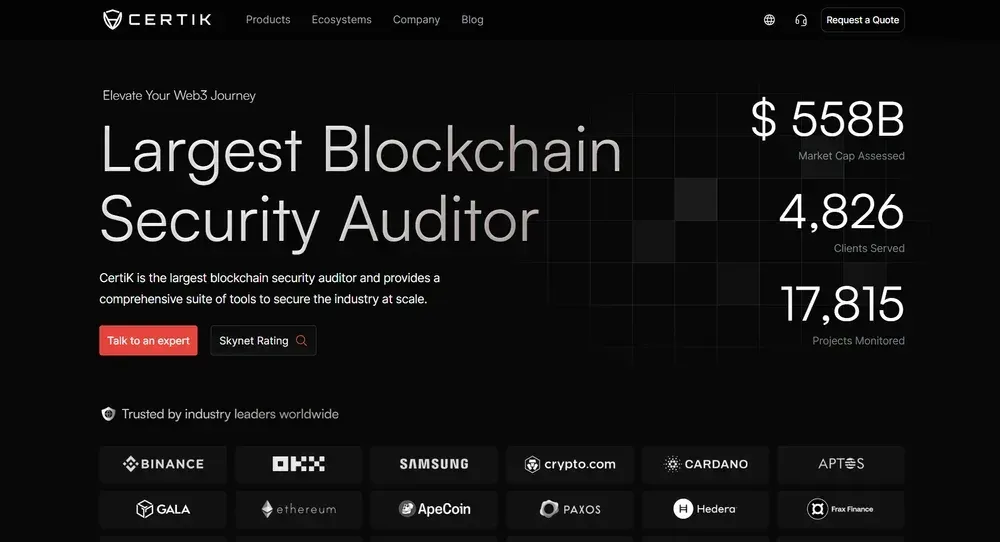
2. Hacken
Hacken took its time mastering smart contract security, but when their service went live, it raised standards for the entire industry. With over 1,500 audited clients since 2017 and a team of 60+ top-class engineers, Hacken’s rigorous approach includes double line-by-line code reviews and separate lead auditor verifications.
What truly sets Hacken apart is its use of penetration testing, which include real simulated cyberattacks that proactively uncover hidden vulnerabilities. Backed by ISO 27001 certification, Hacken is consistently trusted by some of the biggest names in crypto spanning from exchanges to decentralized protocols.
Why Choose Hacken?
- Supported Blockchains: Ethereum, BNB Chain, Solana, Avalanche, Near, and over 10 additional blockchains.
- Services: Smart contract audits, blockchain protocol audits, penetration testing, tokenomics audits, and bug bounty programs.
- Major Clients: Binance, CoinGecko, Gate.io, Aurora, and Vechain.
- Hacked Clients: Warp Finance ($7,800,000), Merlin Labs ($680,000), Velocore ($6,800,000).

3. OpenZeppelin
OpenZeppelin built its reputation by making secure smart contracts accessible to developers from day one. With industry-leading, open-source libraries and an AI-powered Contracts MCP tool, the company has turned complex security processes into something developers actually enjoy using.
Unlike firms that rely only on manual reviews, OpenZeppelin offers specialized ZK-Proof audits and invariant testing, protecting blockchain applications at the cryptographic level. Over $50 billion of secured value later, OpenZeppelin remains the trusted partner of crypto's most innovative projects.
Why Choose OpenZeppelin?
- Supported Blockchains: Ethereum, Base, Arbitrum, Optimism, Polygon, Avalanche, ZKsync, and over 20 other blockchains.
- Services: AI-driven smart contract audits, blockchain infrastructure assessments, real-time monitoring, and open-source security libraries.
- Major Clients: Uniswap, Coinbase, Ethereum Foundation, AAVE, Compound, and Polkadot.
- Hacked Clients: Audius ($6,000,000), Saddle Finance ($275,735).
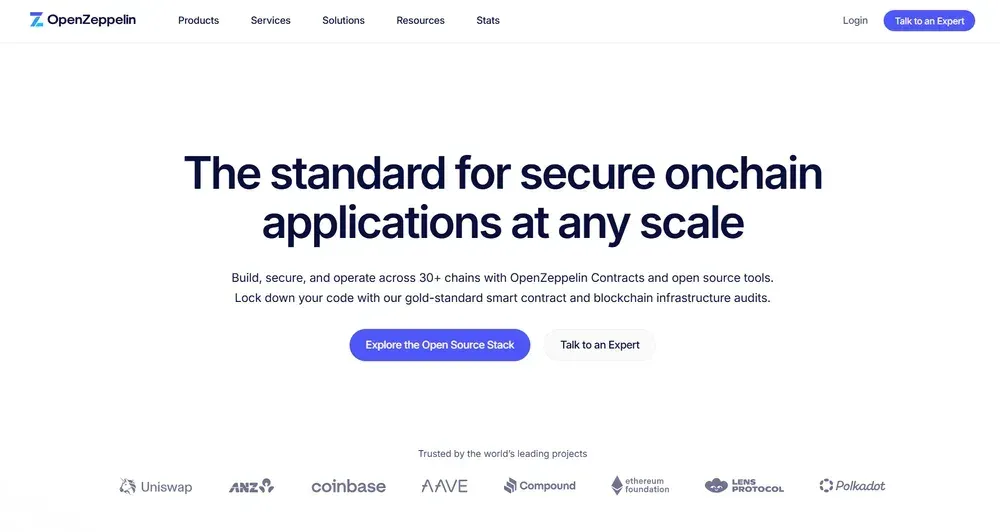
4. Trail of Bits
Since launching in 2012, Trail of Bits has become the go-to smart contract auditor for crypto's heaviest hitters. Ethereum, Compound, Uniswap are just a few of the big names who trust Trail of Bits' relentless approach, powered by proprietary fuzzing tools like Slither, Echidna, and Medusa.
Instead of standard box-ticking, Trail of Bits digs deep with mathematical invariant-testing, preventing sophisticated economic exploits like front-running and price-manipulation. Its engineers actively train client teams in threat-modeling techniques, ensuring security resilience that extends far beyond the initial audit.
Why Choose Trail of Bits?
- Supported Blockchains: Ethereum, Optimism, Cosmos, Solana, and Starknet, among others.
- Services: Smart contract auditing, invariant-driven fuzz-testing, blockchain economic risk assessments, and security engineering training.
- Major Clients: Uniswap, Compound, Aave, Facebook, and DARPA.
- Hacked Clients: Raft ($3,300,000).
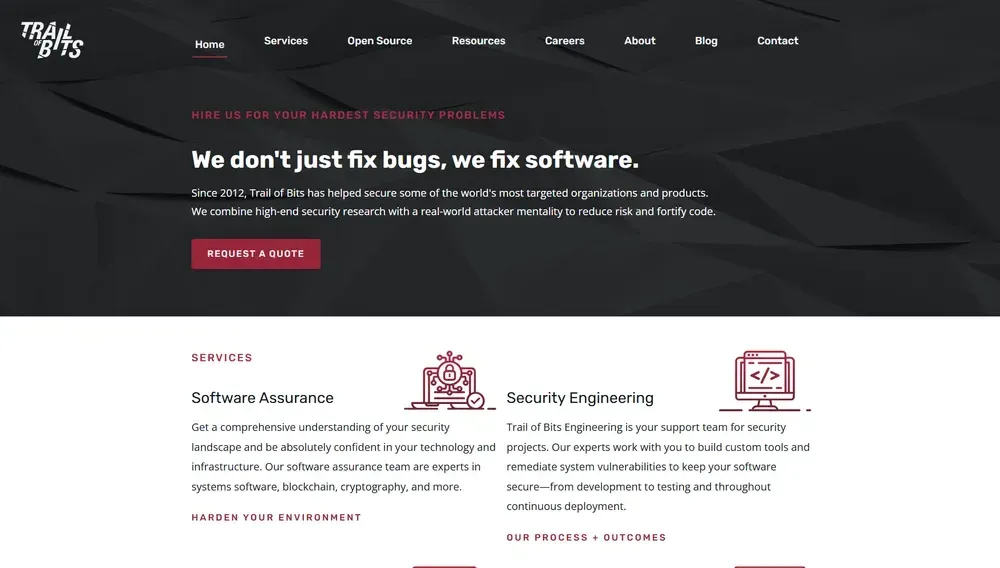
5. Halborn
Much like Norton’s business-grade antivirus, Halborn offers professional-grade security products aimed squarely at high-value blockchain projects and financial institutions. With SOC2 Type 2 certification and over 2,500 completed assessments, Halborn provides structure, credibility, and scale that most firms can’t match.
Included as part of their core product is a red team testing suite, which simulates real-world cyberattacks against protocols like Solana to test response readiness and resilience. Additional services include security advisory and ongoing testing, trusted by enterprise clients who manage over $1 trillion in digital assets.
Why Choose Halborn?
- Supported Blockchains: Ethereum, Solana, Polygon, Avalanche, BNB Chain, zkSync, and over a dozen more.
- Services: Smart contract auditing, red team simulations, penetration testing, and enterprise security advisory.
- Major Clients: Solana, Coinbase, Polygon, Yuga Labs, Animoca, and Uniswap.
- Hacked Clients: Seneca Protocol ($6,400,000), MonoX ($31,400,000), Unizen ($21,000,000).
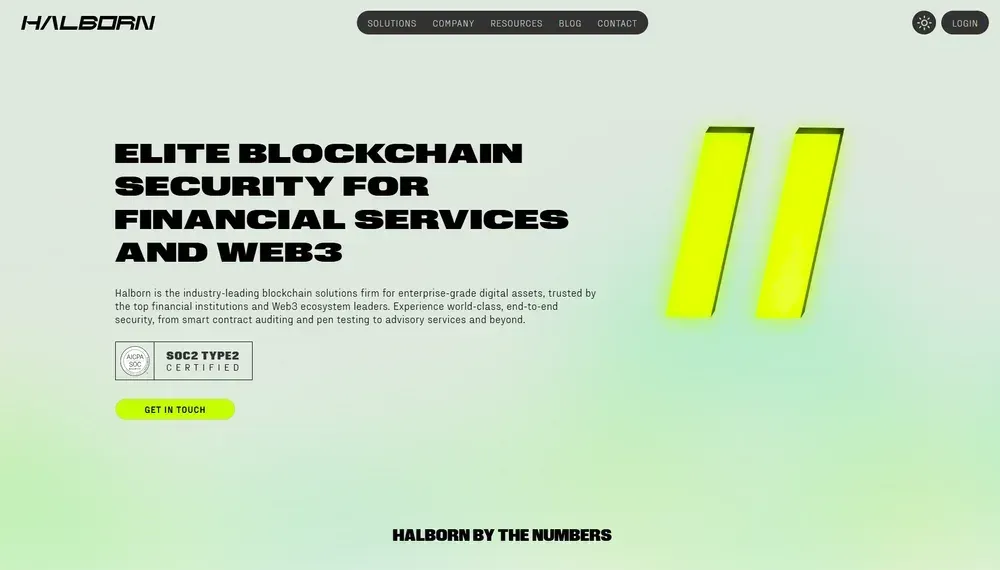
6. Quantstamp
Quantstamp is good for the security-conscious Web3 builder who needs consistency, depth, and clear communication throughout the audit process. Since 2017, they’ve completed over 1,100 audits and built a reputation for reliability across DeFi, gaming, infrastructure, and enterprise-grade deployments.
The smart contract audit includes a full team of three or more engineers and combines manual code review, static analysis, and formal verification. Findings are delivered early, followed by direct collaboration and a fix-review process that ensures all updates are thoroughly re-checked before final delivery.
Why Choose Quantstamp?
- Supported Blockchains: Ethereum, Solana, Polygon, TON, Avalanche, Cardano, Arbitrum, and over 50 others.
- Services: Smart contract audits, economic exploit analysis, infrastructure reviews, and smart contract insurance.
- Major Clients: OpenSea, Dapper Labs, Maker, Alchemy, API3, and Square Enix.
- Hacked Clients: Alpha Finance ($37,500,000), Rari Capital ($10,000,000), Saddle Finance ($275,735).
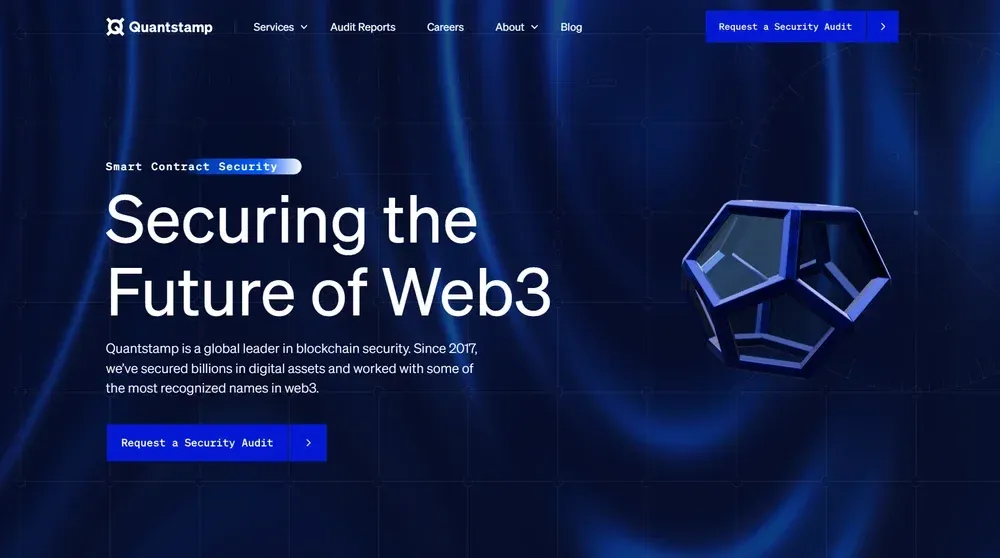
7. Hashlock
The Hashlock Total Protection product comes from a smart contract auditing company that supports over 15 ecosystems and promises quotes in under 3 hours. Each engagement includes manual line-by-line review, vulnerability analysis, and simulated attacks using internal offensive testing tools.
Their process follows five defined phases and ends with a comprehensive report that not only rates risk but also educates users and investors. By sourcing researchers from bug bounty environments, Hashlock ensures rare logic flaws are found before launch, not after.
Why Choose Hashlock?
- Supported Blockchains: Solana, Polkadot, Cosmos, Starknet, Fantom, Kadena, Ethereum, and additional Layer 1 and Layer 2 networks.
- Services: Move, Rust, and Solidity audits, DePIN and bridge reviews, tokenomics audits, KYC, threat monitoring, and AI risk evaluation.
- Major Clients: Red Belly, Manifest, Immersve, Peaq, SushiSwap, Rocket Pool, Gala Games, and Algem.
- Hacked Clients: None publicly reported as of 2025 (confirmed via rekt.news and audit history).
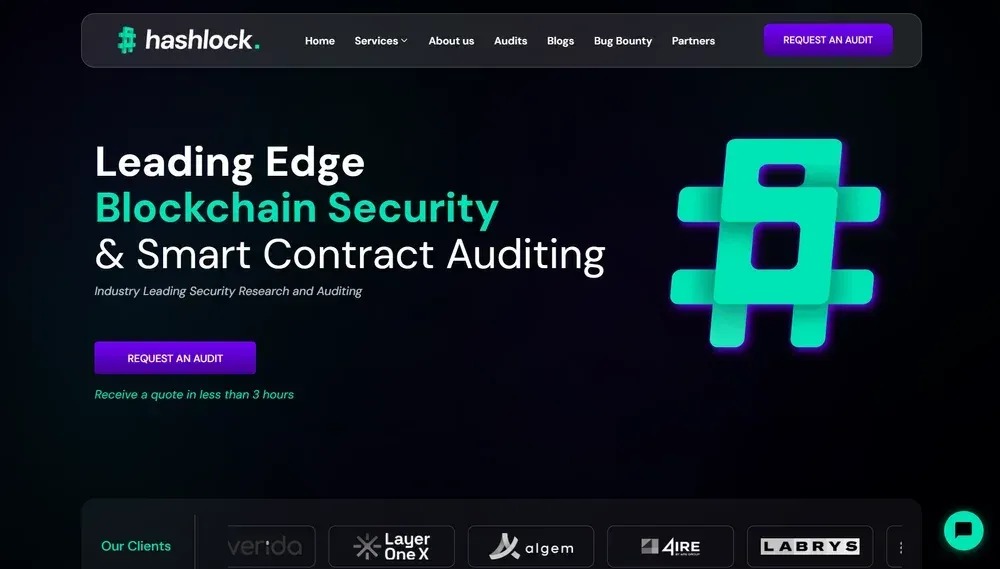
8. SlowMist
Generally speaking, SlowMist’s security architecture and full-stack audits are similar to those of other top smart contract auditors. The main difference is their attack-simulation approach: they use a layered system of black-box, gray-box, and white-box testing, covering everything from RPC endpoints to consensus security.
Their offerings include wallet audits, protocol-level assessments, AML tracing, real-time threat intel, and rapid incident response. Combined with tooling like MistTrack and FireWall.x, their stack doesn't just catch bugs; it tracks attackers and helps recover assets when incidents occur.
Why Choose SlowMist?
- Supported Blockchains: Bitcoin, Ethereum, Monero, Polkadot, Cosmos, Sui, and dozens of public and consortium networks.
- Services: Exchange and wallet security audits, consensus-level blockchain testing, smart contract audits, red teaming, threat intelligence, and asset tracing.
- Major Clients: Binance, OKX, Crypto.com, Amber Group, HashKey, HTX, Bitget, BTCBOX, and BHEX.
- Hacked Clients: Vee Finance ($34,000,000).
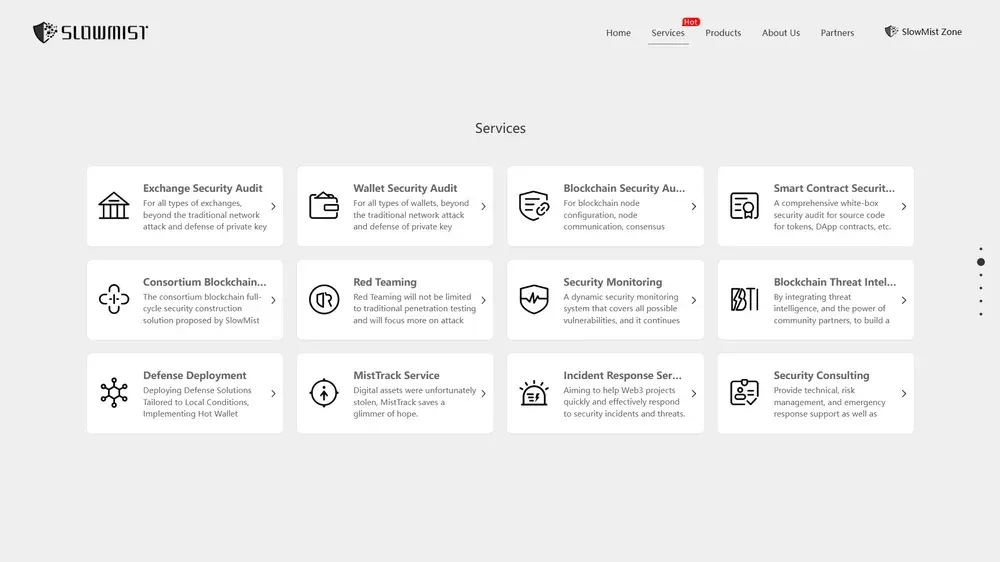
9. ChainSecurity
The most recent influx of smart contract auditors has split between two categories: flashy marketing firms and shallow checklist reviewers. ChainSecurity arrived to split the difference, conducting deep technical audits without the noise, trusted since 2017 by top DeFi teams.
Their method combines formal verification, protocol-level reasoning, and cross-functional risk reviews that span across governance, tokenomics, and multi-chain integration. With a background in research and product security, their auditors bring real cryptography, not just code scanning.
Why Choose ChainSecurity?
- Supported Blockchains: Ethereum, Arbitrum, Polygon, Base, Starknet, Avalanche, and other EVM-compatible ecosystems.
- Services: Formal verification, compiler review, smart contract auditing, governance integration, and complex protocol logic testing.
- Major Clients: MakerDAO (now Sky), Curve Finance, Uniswap Foundation, Enzyme, Gearbox.
- Hacked Clients: ResupplyFi ($9,800,000), KyberSwap ($48,000,000).
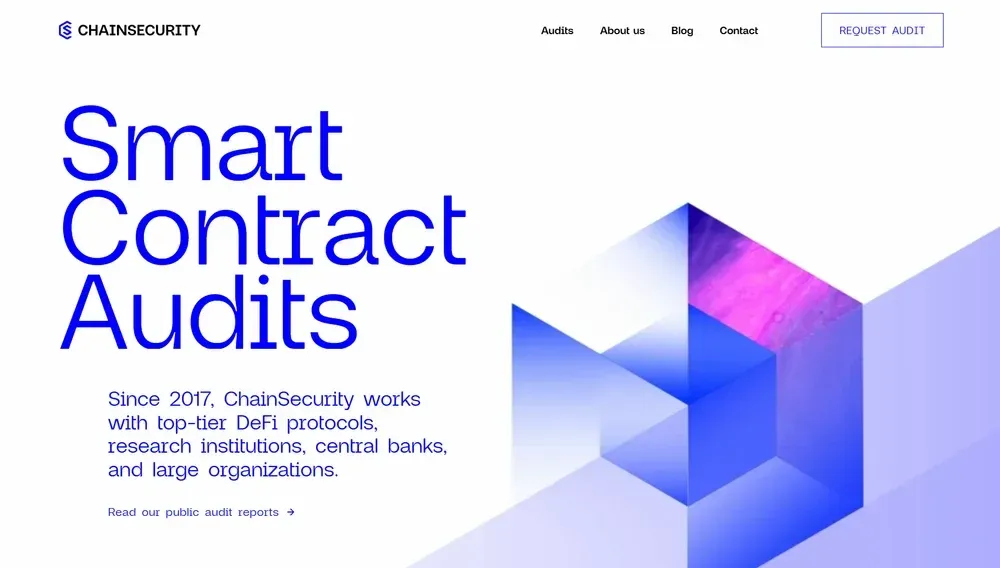
10. SourceHat (Solidity Finance)
Overall, SourceHat is the best bang-for-buck smart contract auditing company for teams shipping across EVM-compatible chains. With 1,800+ audits, over 8,000 contracts reviewed, and $50 billion+ secured, they’ve earned a reputation for accessibility and thoroughness.
Their audit product includes static analysis, thorough manual review, peer checking, and public-facing reports that clients can attach to presale listings. At the time of writing, most token or DeFi protocol audits are completed in 2-14 days, with same-day delivery available for simple contracts.
Why Choose SourceHat?
- Supported Blockchains: Ethereum, BNB Chain, Arbitrum, Polygon, Fantom, Avalanche, Optimism, Harmony, KuCoin, and other EVM-compatible chains.
- Services: Smart contract audits, contract development, KYC verifications, server penetration testing, and back-end security.
- Major Clients: Jones DAO, Plutus DAO, Yieldification, Lybra Protocol, Radiant Capital, and FEG.
- Hacked Clients: Grim Finance ($30,000,000), Elephant Money ($22,200,000), Revest Finance ($2,010,000).

Smart Contracts Explained Simply
A smart contract is code stored on a blockchain (like Ethereum or Arbitrum) that runs automatically when certain conditions are met. It replaces the need for middlemen by letting users do things like swap tokens, earn staking rewards, vote in governance systems, deploy memecoins, and even claim airdrops.
Unlike traditional software, smart contracts are fully visible on blockchain explorers such as Etherscan, so anyone can verify how they work and which crypto wallet addresses interact with them. For example, a staking contract distributes rewards based on time locked, while a bridge contract moves assets between chains.
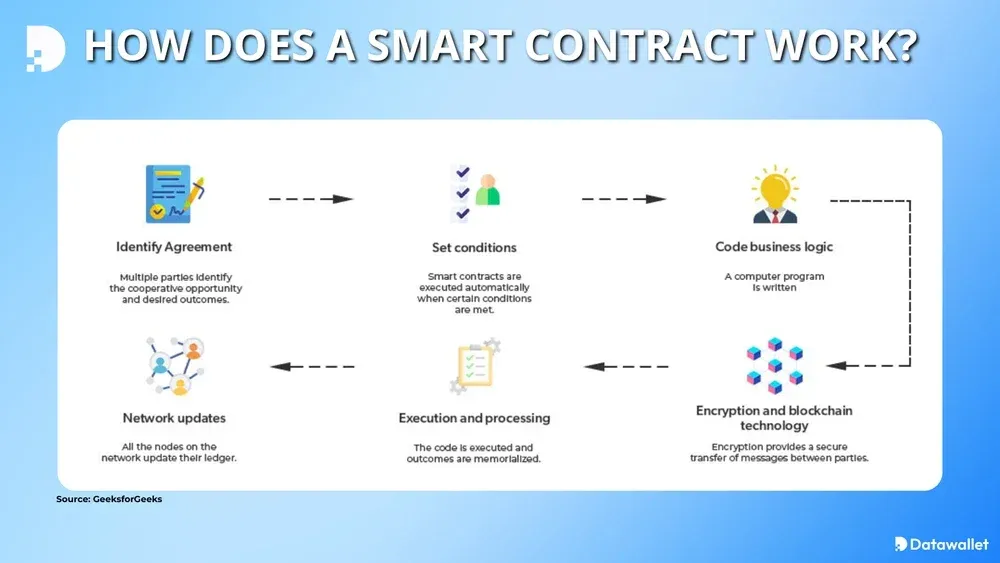
What is a Smart Contract Audit?
A smart contract audit is a thorough inspection of a DeFi protocol's code to catch bugs, logic errors, and security risks before deployment. Because smart contracts are irreversible once live, any flaw left in the code can be permanently exploited, often at the user’s expense.
During an audit, security engineers review the code line by line, run targeted tests, and simulate both common and unexpected attack scenarios. They look for vulnerabilities like reentrancy or price manipulation but also flag less obvious risks such as insecure access controls or unchecked arithmetic.
The final audit report outlines each issue found, assigns a severity level, and explains how the team addressed or mitigated it. Many reports are made public so users and investors can verify that proper security reviews were completed before launch.
How to Audit a Smart Contract
Auditing a smart contract requires a structured process, advanced tools, and security-focused thinking. Whether written in Solidity, Vyper, or Rust, a proper audit ensures smart contracts behave securely and predictably in live blockchain environments.
Here’s how the professional audit process typically works:
- Scope the Project: Auditors begin by reviewing documentation like whitepapers, architectural diagrams, and codebases to understand what the smart contract is designed to do.
- Freeze the Codebase: Once the team submits final code, no further edits are allowed during the audit to ensure accuracy across all findings and remediations.
- Automated Analysis: Static analysis tools like Slither, Mythril, Echidna, and MythX scan the codebase to detect common vulnerabilities, style issues, and security flaws.
- Manual Code Review: Expert auditors then perform a line-by-line inspection of the contract logic to catch hidden risks that automated tools often miss.
- Functional Testing: Unit tests, integration tests, and property-based fuzzing are used to simulate different usage scenarios and identify edge-case failures.
- Issue Classification and Reporting: Every vulnerability is categorized by severity (critical, major, medium, minor, or informational) and compiled in an audit report with suggested fixes.
- Client Fix Review and Final Report: After the team makes code changes, auditors verify the fixes and publish a final report, often shared publicly for transparency and trust.
Even with the right tools and testing frameworks, smart contract auditing takes deep expertise and years of hands-on development experience. That’s why most Web3 teams turn to professional audit firms. We recommend choosing one from our list to avoid expensive and irreversible mistakes.
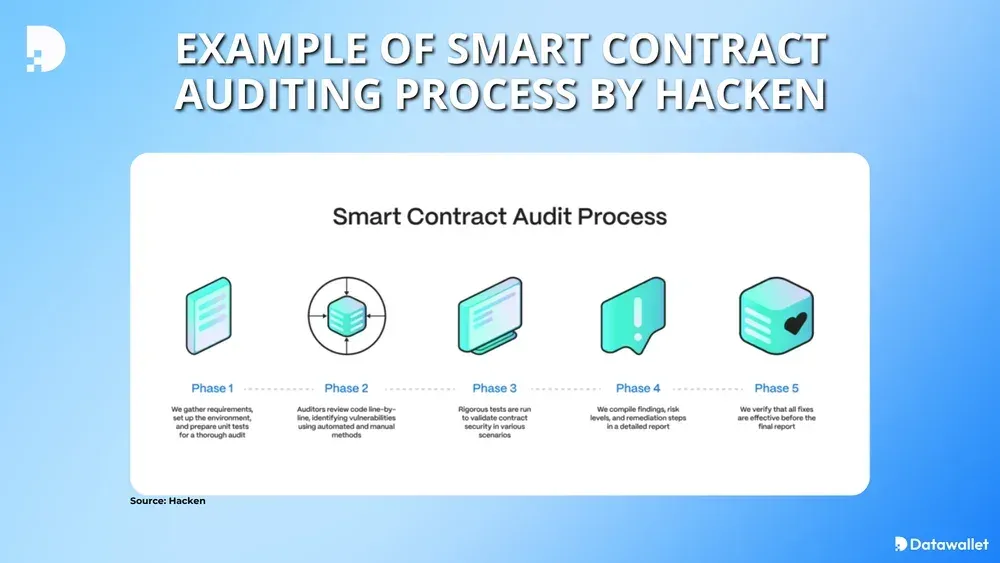
Common Smart Contract Vulnerabilities
Even well-funded projects with experienced developers have fallen victim to recurring smart contract weaknesses. Below are some of the most frequent and costly vulnerabilities in Web3 history, along with notable real-world incidents:
- Reentrancy Attacks: A contract repeatedly calls itself before finishing execution. This flaw enabled both The DAO and Minterest exploits.
- Access Control Failures: Missing or misconfigured admin permissions allowed unauthorized access, as seen in the $240M Euler Finance exploit.
- Unchecked External Calls: When contracts call others without proper error handling, funds can be lost. Parity’s multisig wallet hack from way back in 2017 is a prime example.
- Oracle Manipulation: When prices depend on insecure oracles, attackers can manipulate value. Mango Markets lost $100M to this exact weakness.
- Flash Loan Exploits: Instant loans with no collateral were used in Alpha Homora and Harvest Finance to drain funds in a single transaction.
- Proxy Upgrade Abuse: Poorly secured upgrade logic allowed malicious contract changes. ZKasino lost $33M through an unauthorized upgrade.
- Centralization of Privileges: Ankr lost $100M when a private key controlling mint permissions was compromised due to poor decentralization.
- Cross-Chain Bridge Vulnerabilities: Wormhole’s $325M hack was the result of missing signature verification in its Solana-Ethereum bridge code.
Final Thoughts
Smart contracts power everything from DEXs to DAOs and the right audit partner can mean the difference between launch and liquidation. From tooling and turnaround to methodology and monitoring, each firm brings something different to the table.
We reviewed dozens of providers listed by Alchemy, dug into public audit records, cross-checked exploit histories, and spoke with developers firsthand.
The result was a clear picture of which companies stand out for their services: top-tier security firms like CertiK, Trail of Bits, OpenZeppelin, Halborn, and Hashlock, with each helping projects follow a blueprint that leads to mainnet, not mayhem.
Frequently asked questions
How much does a smart contract audit cost?
Prices vary based on code complexity, audit depth, and firm reputation. Most audits range from $5,000 to $50,000, though high-stakes projects can pay more.
How long does it take to audit a smart contract?
Simple token audits may take 2-5 days. Complex DeFi protocols can require 2-4 weeks depending on scope and responsiveness during the fix phase.
Do all projects need a smart contract audit?
If a project handles user funds or controls protocol logic, an audit is essential. Even open-source forks can introduce bugs during custom implementation.
Are public audit reports necessary?
Publishing audit reports builds community trust, increases transparency, and is often required for listings or partnerships on major DeFi platforms.
%2520(1).webp)
Written by
Antony Bianco
Head of Research
Antony Bianco, co-founder of Datawallet, is a DeFi expert and active member of the Ethereum community who assist in zero-knowledge proof research for layer 2's. With a Master’s in Computer Science, he has made significant contributions to the crypto ecosystem, working with various DAOs on-chain.


%25201%2520(1).webp)

.webp)
.webp)




